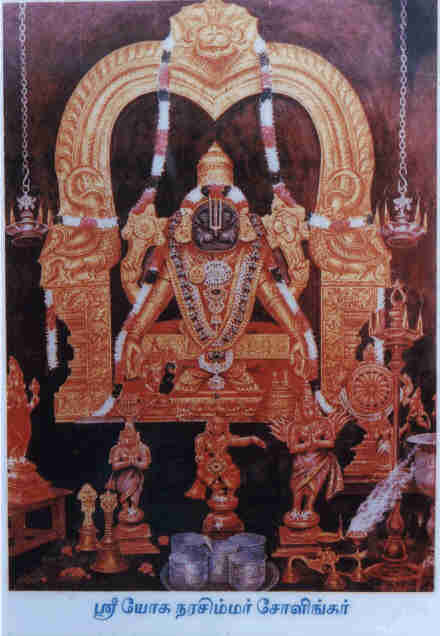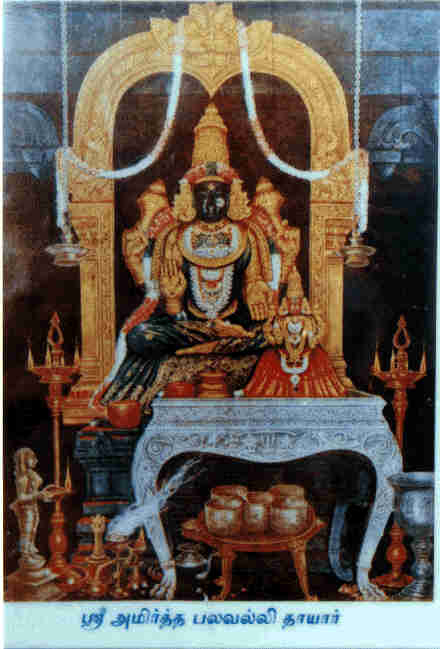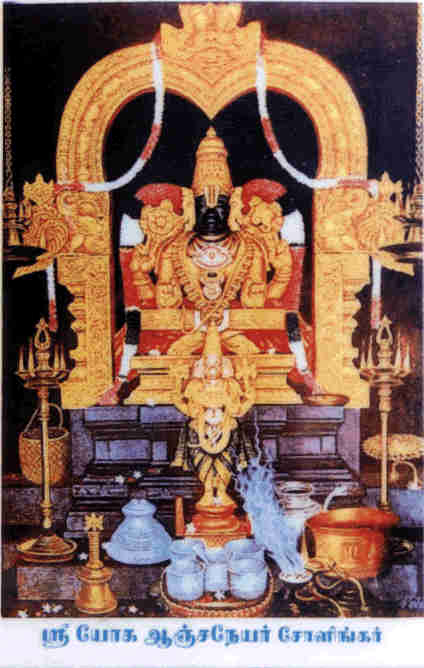



Thakkan kulam means pond of Sri Thakkan or, pond equal to Sri Thakkan, in glory! It is also considered as glorious as Gaya Kshetram. Lord Brahma is being praised by Vedas. All living beings in this Universe were created by him. Since he bathed in this pond, it is called Brahma theertham. Satadharma was a brahmin, who desired to redeem his father from naraka. One sage came and advised him to go to Gaya Kshetram. At that time an oracle was heard that instead of going to Gaya, he should go to Ghatikachalam and bathe in Brahma theertham. Earlier Devas had weighed in balance Gaya and Ghatikachalam, and found Ghatikachalam to be more sacred. The brahmin came here and after bath in this pond, worshiped Sri Yoga Narasimha and got his father redeemed from hell. Thus the water of this pond would do us all good. There are many theerthams around. Bhairava theertham, is capable of eliminating disease and fear. Then we can see Avavartha theertham, created by Lord Balarama, when the mountain here started growing uncontrolled and was dragged down. We also see Pandava theertham, Agastya theertham, Gautama theertham, Sri Rama theertham, etc. The Lord of Kanchi, wanted to publicize the glory of Thakkan kulam. We will see that later. Now we will see sloka 2:
idam jnanam upasritya
mama sadharmyam agatah
sarge ’pi nopajayante
pralaye na vyathanti ca
"By becoming fixed in this knowledge, one can attain to the transcendental nature like My own. Thus established, one is not born at the time of creation or disturbed at the time of dissolution."
This sloka explains one of the important tenets of Visishtadvaita philosophy. Idam = this [what the Lord is about to preach], jnanam = knowledge, upasritya = attained [another version of the sloka has this word as apasritya = attached, but both convey same meaning overall]. Sadharmyam = equal to, mama = Me [Sri Krishna], agata = attained, sarge'pi = even in creation, nopajayante = does not become a part. Those who have learnt the knowledge the Lord was about to preach, attain Moksham and become equal to the Lord and then, never get created or never be a part in creations! That is they are never reborn. Ca pralaye = also in the deluge, na vyathanti = never suffer. That is no more death in samsaram. Thus birth-death cycle ceases and they attain Moksham. We have to understand a basic concept in this sloka. Earlier the Lord said that the knowledge the Lord was about to impart, was learnt by great sages and had escaped from samsaram and attained supreme level of atma prapti or Moksham. Here two points are to be noted: one, escaping from samsaram; and the other is attaining a superior level. That is they discard samsaram and obtain better status. This is called anishta nivrutti [अनिष्ट निवृत्ति]and ishta prapti [इष्ट प्राप्ति][discarding undesirable and obtaining desirable]. Both have to be there. In Brahma theertham we discard papas such as domestic problems. Immediately, we should have Sri Narasimha's blessings. The holy bath here is recurring daily. Whereas Sri Krishna talks of discarding samsaram for ever! This idea is being explained by the Lord in this sloka, by two concepts. One is becoming like Him - attaining desired one [ishta prapti]. Before this, this person is never part of creatin or he is never born, nor he suffers in great deluge or never dies. This is discarding the undesirable [anishta nivrutti]. For Prahalada, He destroyed Hiranyakasipu [anishta nivrutti] and appeared [ishta prapti]. Three points are to be noted. In Upanishad it is told, ' sabha vidwan punyasape viduya niranjana: paramam samyam upaidi' - a jeevatman discarding all papa/punya, goes beyond river Viraja. According to Advaita philosophy, jeevatma -paramatma integration is told. Aham brahmasmi is interpreted in Advaita, as ' I [jeevatman] am brahma [God]'. This is abheda gyana or no difference concept. According to Advaita, jeevatman and Paramatman become one after Moksham. In fact as long as we see jeevatman and Paramatman as different, it is samsaram, according to Advaita. Swami Ramanuja in Gita Bhashyam, however argues that the word used in this sloka is sadharmyam, which means equal to and not the same as Paramatma. He neither says that the person who gets this Gyana, is Himself. He has also not told that that person and He are not different. That person gets the same glory as the Lord. All dharmas which are characteristic of God, attain that person also. The Lord's dharmas are: apahatapapma, dwijaraha, vimrityu:, visoka:, satyakama, satya sankalpa, etc. They are: never growing old, death and birth less, hungryless, thirstless, sorrowless, successfully completing any assignment, desiring supreme bliss, etc. These qualities are attained by the person. Thus the person becomes equal in these qualities; but never the Lord. As told earlier, in Upanishad, it is clear that he who eliminates papa/punya, attains equality with the Lord; and, atman which attains mukti, reaches the Lord and enjoys in being with Brahman and enjoying Brahman's auspicious qualities. Here also, it is mentioned that the mukta atman is being with Brahman and not oneness with God. In Gita also this same point is emphasized. Thus by samya sruti, saha sruti and sadharmya smriti, jeevatman after Moksham, never becomes one with the Lord, but attains equality with the Lord and serves the Lord in Vaikuntam. This is a basic difference between Advaita and Visishtadvaita philosophies. The Lord thus tells the result of acquisition of the Gyana, He was to teach Arjuna.
No comments:
Post a Comment